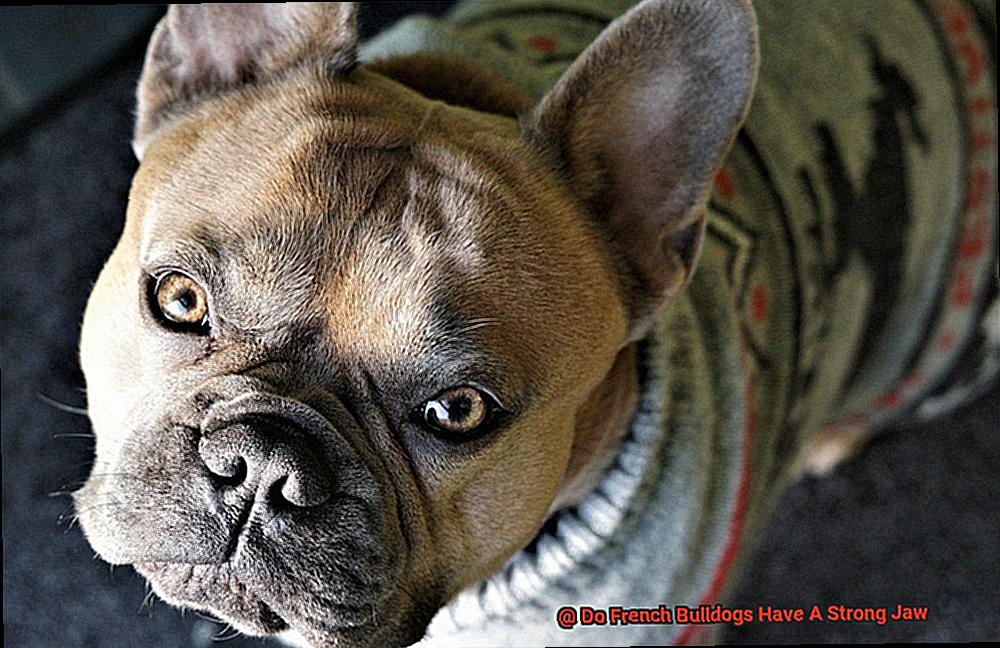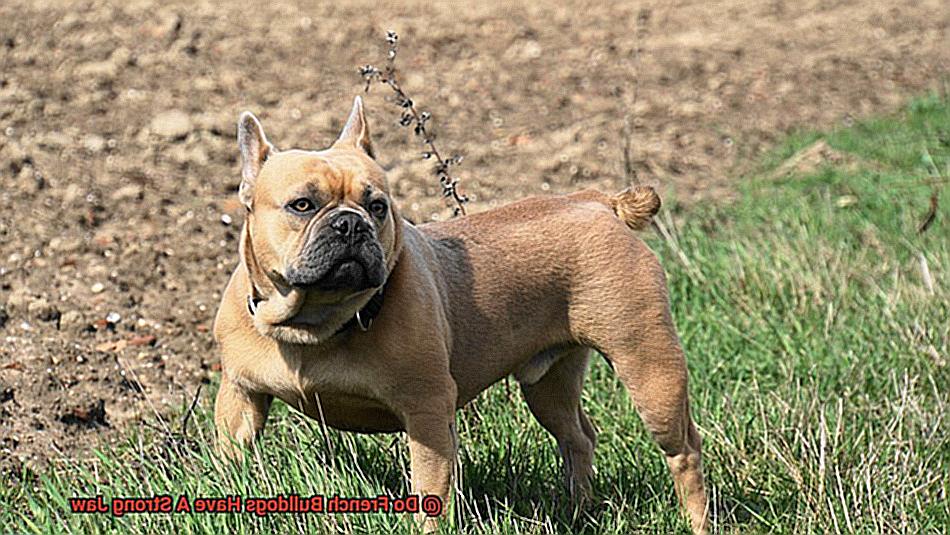Do French Bulldogs Have A Strong Jaw?
Prepare to be amazed as we dive into the hidden strength of French Bulldogs’ jaws. These lovable pups, known for their charming snorts and affectionate nature, may not seem like jaw-dropping powerhouses at first glance. But don’t let their adorable looks fool you – these pint-sized canines pack a surprising punch when it comes to their bite force. In this blog post, we’ll take you on an exciting adventure to uncover the truth about French Bulldogs’ jaw strength.
As dog enthusiasts ourselves, we know that a strong jaw can make all the difference in a dog’s life – from playtime antics to chowing down on their favorite treats. Understanding just how robust a French Bulldog’s jaw is plays a vital role in ensuring their overall well-being and maximizing the fun in every activity.
So, buckle up and join us as we explore the captivating world of these endearing creatures and unravel the secrets behind their formidable jaws. From genetics to anatomy, we’ll delve into the factors that make French Bulldogs true contenders in the canine realm.

Whether you’re already smitten with these wrinkly-faced companions or simply curious about their extraordinary abilities, this blog post is your ticket to valuable insights and debunking any misconceptions about their jaw strength. So grab your leash and get ready for an enlightening journey through the incredible power of French Bulldogs’ jaws.
The Genetics Behind French Bulldogs’ Powerful Jaws
Contents
- 1 The Genetics Behind French Bulldogs’ Powerful Jaws
- 2 Benefits of a Strong Jaw for French Bulldogs
- 3 Are French Bulldogs Aggressive Due to Their Jaw Strength?
- 4 Potential Dental Issues Related to a Strong Jaw in French Bulldogs
- 5 Tips for Caring for Your French Bulldog’s Oral Health
- 6 Toys and Chews Appropriate for French Bulldogs with a Strong Jaw
- 7 Variations in Jaw Strength Among Individual Dogs
- 8 Conclusion
French Bulldogs are beloved for their distinctive appearance and affectionate nature. But did you know that these adorable pups also possess a powerful jaw? In this article, we’ll explore the genetics behind French Bulldogs’ strong jaws and share insights on how to properly care for their oral health.
The Role of Genetics:
French Bulldogs belong to the brachycephalic breed, which means they have a short, wide head shape. This unique head structure contributes to the strength of their jaws. One gene that plays a significant role in jaw development is called DLXMutations in this gene can alter jaw structure and strength.

Studies have shown that French Bulldogs with specific variations in the DLX5 gene tend to have stronger jaws compared to other variations. Additionally, genes involved in craniofacial development, such as BMP3 and BMP7, may also influence the strength of their jaws.
Environmental Factors:
While genetics play a crucial role, environmental factors can also impact the development and strength of a French Bulldog’s jaw. Proper nutrition and regular exercise are essential for maintaining jaw strength. A balanced diet with appropriate nutrients supports the growth of strong bones and muscles. Regular exercise helps keep their overall body condition healthy, including their jaw muscles.
Caring for Their Oral Health:
French Bulldogs may be prone to dental issues due to their short snouts and crowded teeth. To ensure their oral health:
- Regular Dental Care: Schedule regular dental check-ups with your veterinarian to catch any potential issues early on and maintain good dental hygiene.
- Appropriate Chewing Toys: Provide your French Bulldog with toys specifically designed for chewing. Avoid toys that are too hard or small, as they can pose a choking hazard or damage their teeth.
- Brushing Routine: Establish a brushing routine using a dog-friendly toothbrush and toothpaste recommended by your veterinarian. Aim for at least two to three times a week.
- Dental Treats: Offer dental treats that promote oral hygiene while satisfying their chewing needs. Look for treats approved by veterinary dental associations.
Conclusion:
French Bulldogs’ powerful jaws are a result of their genetic heritage and unique head structure. Understanding the genetics behind their jaw strength allows owners to provide appropriate care, such as a balanced diet, regular exercise, and proper dental hygiene. By taking these steps, you can ensure that your French Bulldog’s jaw remains healthy and strong throughout their lives.
Remember, each French Bulldog is unique, and individual variations in jaw strength may exist. If you have any concerns about your dog’s oral health or jaw strength, consult with your veterinarian for personalized guidance.
Benefits of a Strong Jaw for French Bulldogs
From munching on treats to playtime and overall wellbeing, a strong jaw is an essential asset for these lovable companions. So, let’s dive into the perks of having a robust jaw for your French Bulldog.
Chewing and Eating:
Picture this: your Frenchie chomping away at their food with gusto. A strong jaw enables them to chew their meals thoroughly, aiding digestion and preventing potential tummy troubles. By taking the time to savor their food, your furry friend is less likely to inhale it all in seconds, reducing the risk of bloating and weight gain.
Dental Health:
French Bulldogs are prone to dental issues due to their unique brachycephalic (short-nosed) structure. However, fear not. A mighty jaw comes to the rescue by allowing them to exert enough force while chewing on bones or dental treats. This action helps keep their pearly whites clean and healthy while combating tooth decay and other oral concerns. Plus, the constant chewing stimulates saliva production, defending against harmful bacteria buildup.
Jaw Strength for Playtime:
Is your Frenchie a bundle of energy? A strong jaw enables them to partake in lively play sessions without easily getting tired or experiencing jaw fatigue. Whether it’s engaging in tug-of-war battles or gnawing on their favorite chew toys, their sturdy jaws can endure the strain, making playtime more enjoyable while keeping them physically fit.
Satisfying Natural Instincts:
French Bulldogs have inherited instincts related to chewing and biting from their ancestors. A robust jaw allows them to satisfy these natural inclinations without causing harm to themselves or others. By providing appropriate chew toys and dental treats, you can redirect their attention from destructive chewing behaviors to healthier alternatives.
Muscles of Steel:
Just like us humans hitting the gym, French Bulldogs need regular exercise to maintain overall muscle tone. A strong jaw allows them to engage in activities that require jaw strength, such as carrying toys or gnawing on bones. These exercises help strengthen their jaw muscles, which in turn supports their overall physical strength and stability.
Shield Against Injuries:
Accidents happen, but a robust jaw can be a lifesaver for your Frenchie during unexpected falls or collisions. With a stronger bite force, they have a better chance of protecting their face and head from severe injuries. This added layer of defense is particularly crucial for brachycephalic breeds like French Bulldogs, who may be more susceptible to certain accidents due to their distinctive facial structure.
Are French Bulldogs Aggressive Due to Their Jaw Strength?
If you’ve ever wondered whether their strong jaws make these adorable pups aggressive, you’re in the right place. In this article, we’ll delve into the truth behind this common misconception and provide expert insights to help you understand your furry friend better.
The Truth about Jaw Strength:
Contrary to popular belief, a strong jaw does not automatically translate to aggression in dogs. While French Bulldogs do possess a muscular build and a distinctive jaw structure, their jaw strength is not significantly different from other small dog breeds. So, rest assured that their adorable faces are not indicative of aggressive tendencies.
Understanding Aggression in Dogs:
Aggression is a complex behavior influenced by various factors such as genetics, environment, training, and socialization. It is crucial to recognize that aggression is not solely determined by the strength of a dog’s jaws. French Bulldogs are generally known for their friendly and affectionate nature, making them well-suited for families and individuals alike.
Preventing Aggression in French Bulldogs:
Just like any other breed, French Bulldogs can exhibit aggressive behavior if they are not properly trained or socialized. However, this behavior is not directly linked to the strength of their jaws. To prevent aggression, it is essential to prioritize proper training, socialization, and positive reinforcement techniques.
Tips for a Well-Behaved Companion:
- Train early: Start training your French Bulldog as early as possible to establish good behavior patterns.
- Socialize regularly: Expose your pup to various environments, people, and animals to ensure they grow up well-adjusted and confident.
- Seek professional help if needed: If your French Bulldog displays signs of aggression, consult with a professional dog trainer or behaviorist who can provide guidance tailored to your pup’s specific needs.

Creating a Safe Environment:
To ensure your French Bulldog’s well-being, provide them with a safe and nurturing environment. Regular exercise, mental stimulation, and social interactions with humans and other animals are crucial. Remember, a happy and fulfilled Frenchie is less likely to exhibit aggressive behavior.
The Importance of Responsible Breeding:

Responsible breeding practices also play a significant role in shaping a dog’s temperament. Reputable breeders prioritize producing well-rounded and healthy French Bulldogs with stable temperaments, ensuring they have the best start in life.
Potential Dental Issues Related to a Strong Jaw in French Bulldogs
French Bulldogs are beloved for their adorable faces and charming personalities. One prominent characteristic of this breed is their strong jaw, which is important for their ability to chew and bite. However, while a strong jaw may seem like a positive attribute, it can also lead to potential dental issues in French Bulldogs.
Teeth Misalignment:
The force exerted by the strong jaw can cause the teeth to shift or become crooked. This misalignment can lead to difficulties in chewing, biting, and even speaking properly.
Bruxism (Teeth Grinding):
French Bulldogs with a strong jaw may be prone to bruxism, which is the grinding or clenching of teeth. The excessive force applied by the strong jaw while grinding or clenching can wear down the teeth, leading to tooth sensitivity, fractures, and even tooth loss.
Periodontal Disease:
The forceful chewing and biting can cause food particles to get trapped between the teeth, leading to plaque and tartar buildup. If left untreated, this can result in gum inflammation, bad breath, tooth decay, and eventually, tooth loss.
To maintain your French Bulldog’s dental health:
Regular Brushing:
Regularly brushing your Frenchie’s teeth using dog-friendly toothpaste is crucial in preventing dental issues. Aim for daily brushing or at least three times a week.
Veterinary Dental Check-ups:
Regular veterinary dental check-ups are essential to catch any dental issues early on and ensure proper treatment. Your vet can also provide professional dental cleaning under anesthesia if necessary.
Chew Toys and Treats:
Providing appropriate chew toys and treats designed to promote dental health can help keep your Frenchie’s teeth clean and strengthen their gums.
Watch for Signs of Discomfort:
Be mindful of any signs of discomfort or pain related to your French Bulldog’s dental health. These signs may include excessive drooling, difficulty eating or chewing, pawing at the mouth, swollen or bleeding gums, and bad breath.
Tips for Caring for Your French Bulldog’s Oral Health
Taking care of your French Bulldog’s oral health is essential to ensure their overall well-being and prevent painful dental problems. In this article, we will share some valuable tips on how to maintain your French Bulldog’s oral health.
Regular Brushing:
Just like humans, dogs need regular brushing too. Start brushing your French Bulldog’s teeth at a young age to get them used to the process. Use a soft-bristled toothbrush and toothpaste specially formulated for dogs. Make it a positive experience by rewarding them with treats or praise. Aim to brush their teeth at least two to three times a week, or even better, make it a daily routine.
Dental Chews and Toys:
In addition to brushing, providing dental chews or toys can be beneficial for your French Bulldog’s oral health. These products help remove plaque and tartar buildup, keeping their teeth clean and strong. Look for chew toys that are specifically designed to promote dental health, such as those with textured surfaces or ingredients that reduce plaque.
Regular Dental Check-ups:
Just like humans, dogs need regular dental check-ups too. Schedule annual dental check-ups with your veterinarian to detect any dental issues early on. Your vet may recommend professional teeth cleaning if necessary, ensuring the best oral health for your furry friend.
Mindful Diet:
Your French Bulldog’s diet plays a significant role in their oral health. Avoid feeding them sticky or sugary foods that can contribute to tooth decay. Instead, opt for high-quality dog food that supports dental health. Additionally, provide fresh water to keep their mouth hydrated and rinse away any food particles.
Pay Attention to Signs of Dental Problems:
Stay vigilant and observe any signs of dental problems in your French Bulldog. Look out for bad breath, excessive drooling, difficulty chewing or eating, pawing at the mouth, or bleeding gums. If you notice any of these signs, consult your veterinarian promptly for proper diagnosis and treatment.
Toys and Chews Appropriate for French Bulldogs with a Strong Jaw
French Bulldogs are known for their strong jaws, which means they require toys and chews that can withstand their powerful chewing abilities. When selecting toys and chews for your French Bulldog, it is important to choose ones that are durable, safe, and appropriate for their jaw strength. Here are some options that are perfect for French Bulldogs with a strong jaw:
- Rubber Chew Toys: Rubber chew toys are designed to be tough and long-lasting, making them ideal for dogs that love to chew. Look for rubber toys that are made from high-quality, non-toxic materials to ensure the safety of your furry friend. These toys come in different shapes and sizes, so you can find one that suits your French Bulldog’s preferences.
- Rope Toys: Rope toys are great for interactive play and can also help clean your dog’s teeth. Look for rope toys that are made from durable materials and are specifically designed for strong chewers. Avoid toys with small parts or loose threads that could pose a choking hazard.
- Durable Plush Toys: Plush toys can be a great option if you have a French Bulldog with a strong jaw. Look for plush toys that are made from heavy-duty materials and have reinforced seams to withstand your dog’s chewing power.
- Antler Chews: Antlers are naturally shed by deer and elk, making them a sustainable and eco-friendly choice. They are extremely durable and can provide hours of chewing enjoyment for your furry friend. However, it is important to monitor your French Bulldog while they are chewing on an antler to ensure they do not break off small pieces, which could be a choking hazard.
- Bully Sticks: Bully sticks are a popular choice among dog owners. These natural chews are made from dried bull penises and provide a long-lasting chewing experience. They are highly digestible and can help promote dental health by reducing plaque and tartar buildup.
When selecting toys and chews for your French Bulldog, it is important to avoid toys that are too small or easily breakable. Small toys can be a choking hazard, while easily breakable toys can lead to ingestion of small pieces, which may require a visit to the vet. Choose toys that are appropriately sized for your French Bulldog and are made from durable materials that can withstand their chewing power.
Variations in Jaw Strength Among Individual Dogs
If you’re the proud parent of a lovable Frenchie, you may have wondered about their jaw strength compared to other breeds. Well, let me tell you, there’s more to this topic than meets the eye. As an expert in dog physiology and behavior, I’m here to shed some light on the variations in jaw strength among individual dogs, with a special focus on our beloved French Bulldogs.
Genetics and Breed Characteristics: The Great Influencers
When it comes to jaw strength, genetics play a significant role. Different dog breeds have been selectively bred for various purposes throughout history, resulting in variations in their jaw structure and musculature. French Bulldogs, being a brachycephalic breed with their adorable short snouts, exhibit a relatively weaker jaw compared to some other breeds. This is due to their facial structure affecting the size and alignment of their teeth and jaws.
Size Matters: A Limited Space Dilemma
Mon Dieu. The size of a French Bulldog’s snout limits the space available for their jaw muscles to develop fully. Consequently, this can result in less overall jaw strength compared to breeds with longer snouts. However, don’t fret. While French Bulldogs may have a weaker jaw, it doesn’t mean they lack sufficient biting force for everyday activities.
Nutrition and Exercise: The Key Players
Just like humans, a dog’s diet and exercise habits impact their overall health and strength, including their jaw muscles. To ensure your Frenchie’s jaws are in tip-top shape, feed them a balanced diet that provides essential nutrients for muscle development. Additionally, regular exercise helps strengthen their jaw muscles. So, go ahead and play fetch or engage in interactive games that promote chewing and biting.
Chew Toys: Building Strong Jaws
Ah, chew toys. They’re not just a source of entertainment for our furry friends, but they also help strengthen their jaw muscles. For French Bulldogs, choose toys that are durable and can withstand their chewing prowess. Rubber chew toys, rope toys, durable plush toys, antler chews, and bully sticks are perfect options. Just remember to steer clear of small or easily breakable toys to prevent any potential hazards.
Veterinary Check-ups: A Must-Do
Regular veterinary check-ups are essential for monitoring your Frenchie’s oral health and addressing any potential issues related to jaw strength. Your veterinarian can provide guidance on maintaining good dental hygiene and recommend appropriate treatments or interventions if necessary.
Embrace Uniqueness: It’s Not All About Jaw Strength
While variations in jaw strength exist among French Bulldogs, it’s important to remember that each dog is unique. Instead of solely focusing on jaw strength, consider the overall physical condition and health of your furry companion. French Bulldogs may have a weaker jaw, but they compensate with their charming personalities and lovable nature.
Conclusion
In conclusion, French Bulldogs are known for their strong and powerful jaws.
This breed has a bite force that can surprise you, despite their small size. Their compact and muscular build contributes to the strength of their jaw muscles.
Whether it’s chewing on toys or devouring their food, these dogs can certainly demonstrate the power of their jaws.




